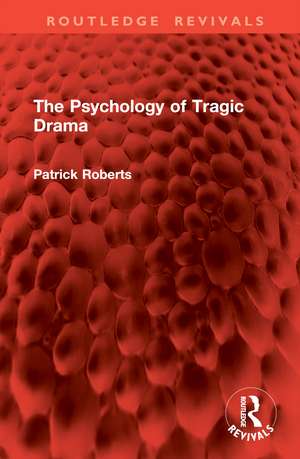The Psychology of Tragic Drama: Routledge Revivals
Autor Patrick Robertsen Limba Engleză Hardback – noi 2024
In his introduction, the author explains and defends the application of psychoanalytical insights to the study of literature. Then in the first part of the book, he proceeds to an exploration of some primitive and infantile situations expressed in Euripides’ Bacchae and in a group of modern dramas by Strindberg, Pinter, Ionesco and Weiss. In the second part he turns to the drama of Aeschylus, Sophocles and Euripides, tracing the psychological history of Orestes and Electra from their Greek originals to their later re-creations in more modern settings, in the plays of O’Neill, Eliot and Sartre, and comparing the treatment of themes and motifs which also reappear in Macbeth and Hedda Gabler. In conclusion, Patrick Roberts discusses the loss and gain involved in the diffused awareness among modern dramatists of psychoanalytical ideas and influence; indeed, the book as a whole stands as a confirmation and expansion of Freud’s comment ‘that poets and philosophers before me discovered the unconscious’. As such, it will appeal not only to all students of serious drama but to all those interested in the two disciplines of literature and psychoanalysis.
Din seria Routledge Revivals
- 9%
 Preț: 801.71 lei
Preț: 801.71 lei - 8%
 Preț: 432.64 lei
Preț: 432.64 lei -
 Preț: 168.89 lei
Preț: 168.89 lei -
 Preț: 245.88 lei
Preț: 245.88 lei -
 Preț: 309.79 lei
Preț: 309.79 lei -
 Preț: 258.73 lei
Preț: 258.73 lei - 9%
 Preț: 764.35 lei
Preț: 764.35 lei - 9%
 Preț: 903.42 lei
Preț: 903.42 lei -
 Preț: 311.18 lei
Preț: 311.18 lei -
 Preț: 357.45 lei
Preț: 357.45 lei - 9%
 Preț: 626.93 lei
Preț: 626.93 lei -
 Preț: 317.54 lei
Preț: 317.54 lei - 9%
 Preț: 764.30 lei
Preț: 764.30 lei -
 Preț: 257.01 lei
Preț: 257.01 lei -
 Preț: 238.40 lei
Preț: 238.40 lei -
 Preț: 259.48 lei
Preț: 259.48 lei - 9%
 Preț: 938.10 lei
Preț: 938.10 lei -
 Preț: 341.33 lei
Preț: 341.33 lei -
 Preț: 264.10 lei
Preț: 264.10 lei -
 Preț: 294.98 lei
Preț: 294.98 lei -
 Preț: 308.89 lei
Preț: 308.89 lei -
 Preț: 207.40 lei
Preț: 207.40 lei -
 Preț: 347.50 lei
Preț: 347.50 lei -
 Preț: 302.59 lei
Preț: 302.59 lei -
 Preț: 389.40 lei
Preț: 389.40 lei -
 Preț: 257.01 lei
Preț: 257.01 lei -
 Preț: 358.30 lei
Preț: 358.30 lei - 9%
 Preț: 640.91 lei
Preț: 640.91 lei - 9%
 Preț: 619.49 lei
Preț: 619.49 lei -
 Preț: 228.88 lei
Preț: 228.88 lei -
 Preț: 265.16 lei
Preț: 265.16 lei -
 Preț: 257.90 lei
Preț: 257.90 lei -
 Preț: 266.06 lei
Preț: 266.06 lei -
 Preț: 258.73 lei
Preț: 258.73 lei -
 Preț: 384.01 lei
Preț: 384.01 lei -
 Preț: 246.38 lei
Preț: 246.38 lei - 9%
 Preț: 832.08 lei
Preț: 832.08 lei -
 Preț: 266.20 lei
Preț: 266.20 lei -
 Preț: 294.53 lei
Preț: 294.53 lei - 18%
 Preț: 695.86 lei
Preț: 695.86 lei - 9%
 Preț: 934.96 lei
Preț: 934.96 lei - 5%
 Preț: 243.38 lei
Preț: 243.38 lei -
 Preț: 274.69 lei
Preț: 274.69 lei -
 Preț: 208.20 lei
Preț: 208.20 lei - 9%
 Preț: 659.19 lei
Preț: 659.19 lei -
 Preț: 259.69 lei
Preț: 259.69 lei - 9%
 Preț: 1038.47 lei
Preț: 1038.47 lei -
 Preț: 389.46 lei
Preț: 389.46 lei -
 Preț: 302.14 lei
Preț: 302.14 lei -
 Preț: 302.27 lei
Preț: 302.27 lei
Preț: 627.95 lei
Preț vechi: 690.06 lei
-9% Nou
Puncte Express: 942
Preț estimativ în valută:
120.20€ • 130.60$ • 101.03£
120.20€ • 130.60$ • 101.03£
Carte tipărită la comandă
Livrare economică 21 aprilie-05 mai
Preluare comenzi: 021 569.72.76
Specificații
ISBN-13: 9781032914978
ISBN-10: 1032914971
Pagini: 246
Dimensiuni: 156 x 234 mm
Greutate: 0.62 kg
Ediția:1
Editura: Taylor & Francis
Colecția Routledge
Seria Routledge Revivals
Locul publicării:Oxford, United Kingdom
ISBN-10: 1032914971
Pagini: 246
Dimensiuni: 156 x 234 mm
Greutate: 0.62 kg
Ediția:1
Editura: Taylor & Francis
Colecția Routledge
Seria Routledge Revivals
Locul publicării:Oxford, United Kingdom
Public țintă
PostgraduateCuprins
Part I: The Exploration of the Primitive 1. Euripides: The Dionysiac Experience 2. Strindberg: The Strong and Cruel Struggle 3. Pinter: The Roots of the Relationship 4. Ionesco: Paroxysm and Proliferation 5. The Marat Sade Play: The Primitive in Action Part II: Orestes and Electra in Greek and Modern Drama 6. Orestes in Greek Drama 7. Orestes in Modern Drama: Mourning Becomes Electra 8. Orestes in Modern Drama: The Family Reunion 9. Orestes in Modern Drama: The Flies 10. Electra in Later Drama: Shakespeare and Ibsen Conclusion
Notă biografică
Patrick Roberts read both Classics and English at Christ Church, Oxford; he followed this with sixteen years on the staff of the Extra-Mural Delegacy of Oxford University in Staffordshire and Kent, and as Resident tutor in East Sussex. At the time of the first publication, he was Lecturer in English at University College, London.
Descriere
First published in 1975, The Psychology of Tragic Drama offers an interpretation of some of the themes of both ancient and modern tragic drama through an investigation of the plays in the light of psychoanalytical ideas. The author explains and defends the application of psychoanalytical insights to the study of literature.
